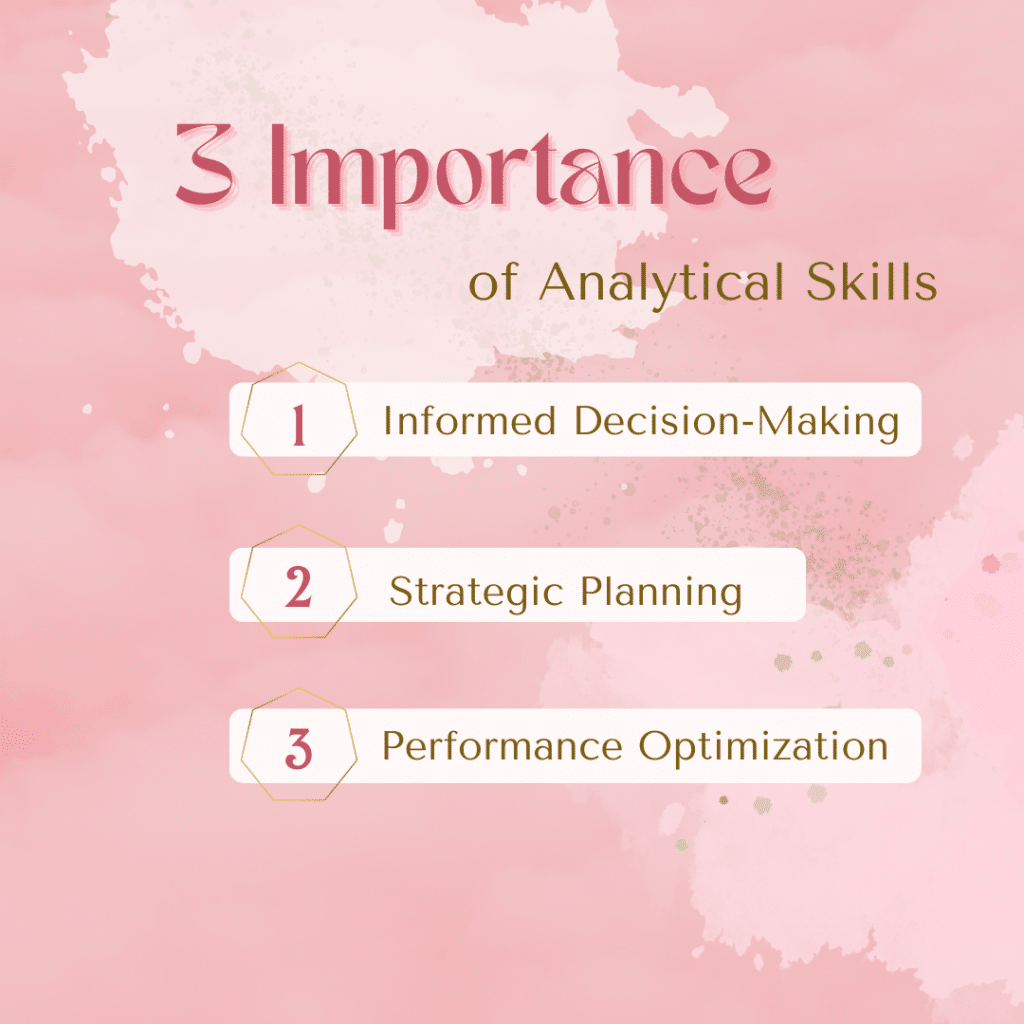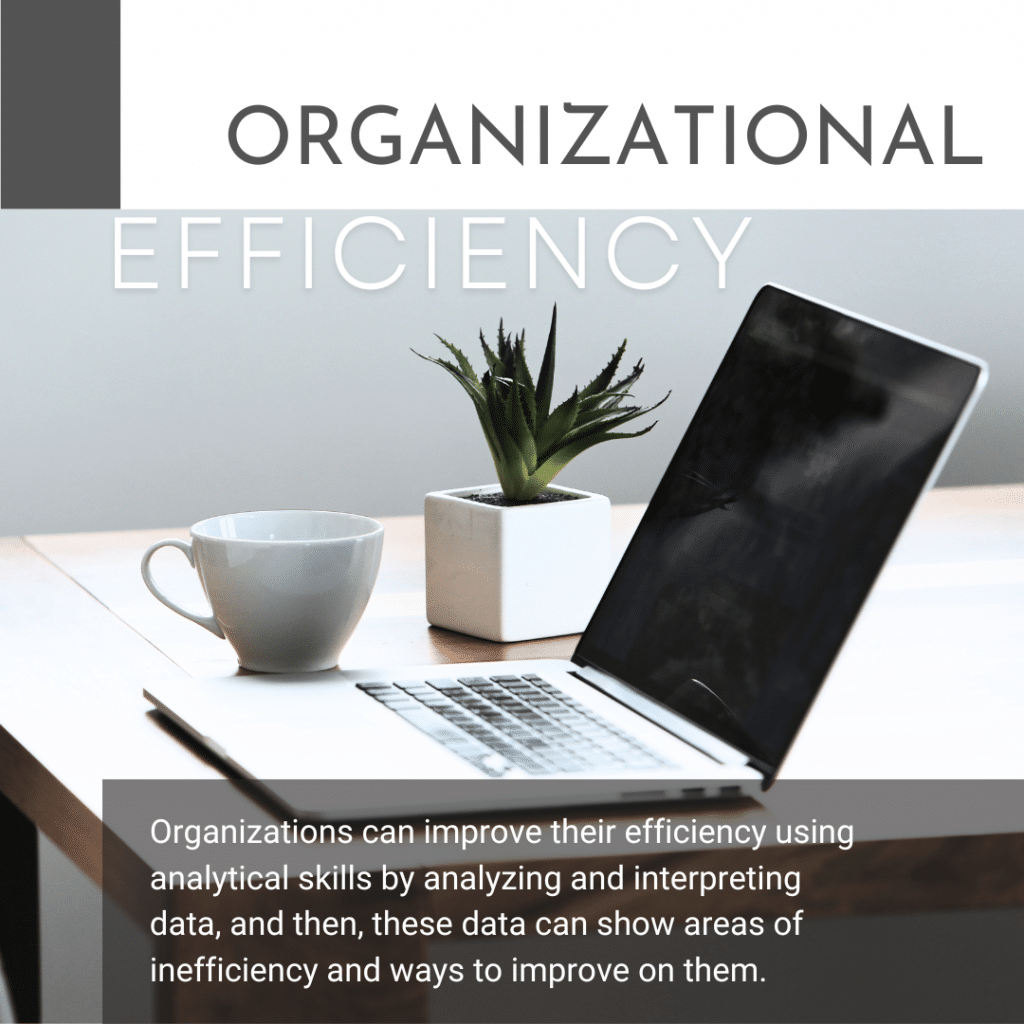Did you know that analytical thinking and creative thinking skills are predicted to be the most important skills for the next few years? With the increased demand for data-driven decision-making, individuals who possess these analytical skills will continue to have a competitive edge over others without. However, it’s not just about having these skills; it’s more about using them effectively to achieve business success. Let me take you on the journey of mastering analytical skills and how these skills help me grow and succeed in my job
KEY TAKEAWAY
Every business organization needs analytical skills to succeed today. Mastering analytics skills is not just about analyzing data, its more about discovering trends and patterns and making strategic and informed decisions from your findings.
Understanding Analytical Skills
Individuals with analytical skills can find solutions to difficult problems. They use data analysis and other skills like creative thinking, research, etc. to make informed decisions about a complex situation.
Analytical skills are more about gathering and analyzing data. It’s also about recognizing patterns, identifying trends, and using that knowledge to make better and strategic decisions that can solve your business problems.
The beauty of analytical skills is that they’re universally applicable. One of the biggest lessons I learned was to see beyond the surface. Analytical skills aren’t just about data; they’re about understanding the story behind the numbers. For example, during a marketing campaign analysis, I discovered that a seemingly successful campaign had a high conversion rate but lacked customer retention.
At first, I was confused. How was it possible? But, as I went into more in-depth analysis, I found out that many customers were first-time buyers but not repeat customers. This insight enabled us to adjust our marketing strategy, create customer loyalty programs, and focus more on building long-term customer relationships. This resulted in a significant increase in repeat business
Key Components of Analytical Thinking
#1. Critical Thinking
If you think about it, critical thinking is like the secret sauce of a detective! This is the foundation of analytical skills. With critical thinking, you can assess pieces of information, recognize biases, and form sound judgments objectively. Critical thinking skills cut across all the positions in a company. So, it is very crucial to develop this skill.
#2. Data Analysis
This skill involves collecting, cleaning, and interpreting data. First, you have to understand the data, find patterns and trends, and then make strategic decisions with your findings. When carrying out data analysis, you will require spreadsheets and data visualization tools like Tableau, etc. to effectively do that.
Making sense of what’s in front of you by identifying trends and patterns is the essence of data interpretation, which goes beyond gathering and analyzing information. Gaining insights from a lot of data with the help of strong data analysis abilities will enable you to present your findings to important decision-makers.
#3. Research
Being a good researcher is vital for gathering the data you need to make sound decisions. This involves knowing where to find such important information, critically evaluating its credibility, and synthesizing it into actionable insights. Getting all the necessary information about a problem will allow you to come up with the best solution. Therefore, before you come up with an effective solution, you will have to do extensive research, to have the necessary knowledge.
#4. Communication
“The ability to communicate data insights effectively is a critical but often overlooked skill. Business leaders need to translate complex data into actionable stories that resonate with all levels of the organization.”
Therefore, even the most brilliant data analysis is useless if you can’t communicate your findings. Strong communication skills allow you to present your findings easily to people of varying expertise. Most employers today rank communication as a must-have skill—and for good reason. Whether it’s writing a report, giving a presentation, or just having a casual conversation, your communication skills are very necessary.
#5. Problem-Solving
Using analytical skills in your business will ensure that you always make the best decision that will enable you to achieve your business goals. With problem-solving skills, you can identify issues, brainstorm potential solutions, evaluate alternatives, and implement the most effective course of action.
#6. Creativity
For any business to succeed, it must use creative thinking. A creative thinker will generate innovative ideas and find solutions to complex problems by thinking outside the box and challenging conventional knowledge.
Importance of Analytical Skills

Having a good analytical mind is like being a business detective! It helps you gather clues (data), understand what’s going on (find patterns), and come up with the best plan to solve problems and make winning choices. Analytical skills are critical for achieving business success across diverse industries and organizational functions ranging from data science, project management, marketing, law, medicine, scientific research, accounting, etc.
#1. Informed Decision-Making
When businesses face different problems, ranging from operational inefficiencies to market fluctuations, analytical skills can empower them to examine such problems, identify root causes, and develop effective solutions. When they leverage data-driven insights, organizations can find opportunities, prevent and mitigate risks, and accurately allocate resources for better outcomes.
Analytical skills have helped me with most of my marketing campaign strategies. I’ve been able to analyze customer behavior data and tailor our campaigns to target specific demographics more effectively, resulting in higher engagement and conversion rates. Furthermore, this will ensure that businesses make informed decisions and drive innovation, as decisions in today’s dynamic business world must be accurate and made fast.
#2. Strategic Planning
Businesses can use strategic planning to set long-term goals, allocate resources, and grow as an organization. Analytical skills play a key role in studying market trends, carrying out competitor analysis, etc., to develop robust business plans. In essence, businesses can adjust to changing market dynamics and capitalize on emerging opportunities with analytical skills
#3. Optimizing Performance
Analytical skills facilitate performance optimization across various business functions. Whether it’s improving manufacturing processes, streamlining supply chain operations, or enhancing marketing campaigns, data analysis allows organizations to identify inefficiencies, optimize workflows, and drive continuous improvement initiatives.
Unlocking Business Value with Analytics
The vast quantity of data that businesses are faced with every day can be overwhelming. Analytical skills allow businesses to filter through numerous data points, identify meaningful trends, and make actionable insights. When businesses use analytical skills to recognize patterns in consumer behavior and market trends, they can make proactive decisions, and stay ahead of their competitors
Furthermore, all businesses are exposed to inherent risks, such as fluctuations in the economy, regulatory changes, or unforeseen setbacks. Companies that retain an analytical workforce have a better chance of evaluating risk factors, estimating possible effects, and creating plans for mitigating these risks. Through risk assessments, businesses may anticipate difficulties and put up backup plans to protect their interests.
Finally, by utilizing analytical skills to their full capacity, businesses will be able to identify new business opportunities that might make their companies leaders among their competitors. They will be able to grow expand and develop innovations that will give you a competitive edge over the competition
How to Use Your Analytical Skills for Business Success
Analytical skills are necessary for every aspect of a business operation, ranging from marketing and customer experience to finance and security. When businesses harness the power of data, they can understand their customers better, make informed decisions, and ultimately achieve lasting success.
Thomas H. Davenport, author & professor at Babson College, emphasized that analytical skills aren’t just for data scientists; they’re vital for all business leaders.
“The ability to take data—to be able to gather it, analyze it, and use it to make decisions—is a hugely important skill in the modern world.”
#1. Enhanced Customer Experience
Gary Marcus, CEO of Good Judgment Open, believes that businesses that can use data to predict customer behavior, market shifts, and potential risks can make strategic decisions and gain a competitive edge. For example, a marketing agency can analyze customer data, which can help identify buying patterns and preferences, assisting the agency to tailor their marketing efforts and improve customer satisfaction, thus improving the customer experience.
Netflix uses advanced analytics to understand viewer preferences and watch history. Using this data, they recommend shows and movies you’re more likely to enjoy, keeping you engaged and subscribed to their platform.
#2. Effective Communication and Stakeholder Engagement
Businesses can better engage key stakeholders by making data-driven decisions and communicating them effectively. Analytical thinkers can present complex information clearly and concisely, making it easier for others to understand and act upon. In essence, this can lead to better outcomes and increased business success.
#3. Business Monitoring
Business analysis allows for more accurate and real-time monitoring of business activities, which will, in turn, help find areas for improvement. In addition, it allows adjustments to marketing and sales strategies to maximize performance in markets where the company is already present.
#4. Data-Driven Decision-Making
Gary Loveman, CEO of Caesars Entertainment, stated
“Analytical skills are at the heart of everything we do at Caesars. We leverage data to understand our customers, personalize their experiences, and optimize our marketing efforts. This data-driven approach has been instrumental in driving revenue growth and customer satisfaction.”
Loveman gives a practical illustration from the hotel sector. Caesars Entertainment employs analytical abilities to learn more about its customers, enhance its services, and eventually succeed as a company.
Additionally, some experts, like DJ Patil, former Chief Data Scientist for the United States, declared that data science is “the sexiest job of the 21st century.”
Organizations that possess analytical abilities can maximize business operations, spur innovation, and improve consumer experiences through the use of data analytics, AI, and machine learning. According to Gartner, companies hoping to prosper in the digital era must invest in analytical skills and cultivate a data-driven culture. For instance, marketing teams use data to assess marketing ROI, personalize campaigns, and understand customer behavior.
#5. Business Operational Efficiency

Organizations that possess analytical skills can simplify operations, boost productivity, and discover different revenue streams. McKinsey highlights that companies looking to gain a competitive edge and sustain growth must invest in analytical skills and capabilities.
Businesses can improve their efficiency using analytical skills. They can analyze and interpret data, and these data can show areas of inefficiency and ways to improve on them. For instance, operations teams use data to find inefficiencies in workflows, streamline procedures, and better allocate resources.
#6. Competitive Advantage
Using the latest tools and technologies, along with consistently improving your analytical abilities, will guarantee that you are at the forefront of data-driven decision-making. To sum up, analytical abilities are a great advantage in today’s corporate environment. Developing and retaining analytical abilities in the workplace can be very beneficial to your business, regardless of your experience level in business.
#7. Increased ROI
Business analysis will promote the agile adaptation of effective business strategies to changes in the market. Therefore, it enables more effective and efficient strategies that contribute to increasing the ROI across its business operations.
#8. Identify Business Opportunities
Analytical skills will help businesses identify new opportunities by analyzing market data. Furthermore, it will also give the business potential directions and scenarios based on past and current data for such growth.
Examples of Companies that Used Analytical Skills to Achieve Business Success
I’ve witnessed firsthand how analytical skills have driven success stories in the business world. For instance, a colleague of mine used data analysis to optimize our supply chain management, resulting in significant cost savings for the company. These success stories highlight the tangible impact of analytical prowess on business outcomes.
#1. Target
The retail giant Target wasn’t always known for its personalized advertising. However, they transformed their consumer experience by using advanced analytics. They also defined purchasing patterns and preferences by analyzing customer purchase data. Therefore, they were able to develop targeted marketing efforts, recommend relevant goods, and even forecast future sales. The outcome? A significant increase in client loyalty and an improvement in sales.
#2. Netflix

Image by Freepik
Netflix, the streaming giant, is a company that understands and values the power of data. They use advanced analytics to understand viewer preferences, track content performance, and identify emerging viewing trends. This data-driven approach allows them to accurately curate content libraries, personalize recommendations, and even produce original shows with a high chance of success. Their superior analytical skills have unquestionably played a major role in their dominance of the streaming sector.
#3. Moneyball
The Oakland Athletics baseball team, with limited resources, faced stiff competition from teams with much larger budgets. The general manager, Billy Beane, used a data-driven approach to choose his players. He found players with great potential using statistical analysis. Though at first, people were skeptical of his actions, this tactic turned out to be rather effective. These players demonstrated that analytical skills might level the playing field by rising to prominence despite their financial limitations.
#4. Amazon
Amazon is also known for customized recommendations. This is advanced analytics at work, not magic. They analyze large volumes of user data, such as past purchases, browsing patterns, and even product reviews. This enables them to provide personalized recommendations for goods that each consumer is likely to find interesting. As a result, they experienced a notable increase in client loyalty, better customer satisfaction, and higher sales. Their aptitude for analysis has surely been a key factor in Amazon’s spectacular growth.
#5. J.P. Morgan Chase
Financial organizations have to contend with the ongoing risk of fraud. Leading financial giant JPMorgan Chase uses artificial intelligence and advanced analytics to tackle this problem. They examine transaction trends and spot anomalies that can point to fraud by using complex algorithms. Additionally, they can identify fraud attempts in real-time thanks to their data-driven strategy, safeguarding their clients and reducing financial losses. The dedication of J.P. Morgan Chase to analytical innovation shows how these abilities may protect companies and guarantee financial stability.
Businesses today use social media listening tools to assess online customer opinion and brand perception. This enables them to pinpoint areas in need of development, swiftly resolve client issues, and modify their marketing tactics to more effectively appeal to their target market. Social listening is a potent illustration of how companies are applying analytical abilities to mine social media data for insightful information that they can use to their advantage.
How to Improve Analytical Skills
It takes time, effort, and dedication to develop analytical skills. Another valuable lesson I’ve learned is to embrace failure as a learning opportunity. From my experience, I’ve found several helpful and practical strategies for honing analytical skills. One of the most effective methods is continuous learning. Whether it’s through online courses, workshops, or reading relevant books, investing in ongoing education is crucial for staying ahead.
Sometimes you may feel tired, but remember that every setback presents a chance to analyze what went wrong, identify areas for improvement, and come back stronger. By adopting a growth mindset and viewing challenges as stepping stones to success, I’ve been able to continuously refine my analytical skills.
#1. Take an Online Analytics Course
The simplest way to acquire and improve your analytical skills—whether you want to learn the basics, brush up on your skills, or expand your knowledge—is by taking an analytics course. A course will allow you to focus on the content you want to learn, network and interact with others in the analytics space, etc
Additionally, there are several universities and online companies like Coursera, HubSpot Academy, Simplilearn, etc. that offer online schooling and free certification courses. After choosing the course you want to improve, the first thing you need to do is research to find the resources that are right for your skill and budget, although you can still find other free and paid courses online.
#2. Get Help from a Professional
You likely know or find someone with more experience than you, someone who is an analytics expert. You can research them, note how they approach situations, and then mirror their actions, save examples, and apply their process to your work.
Furthermore, you can approach them for further guidance by asking them questions on how they developed their skill.
#3. Play Analytical Games
Another way you can improve your analytical skills is to play analytical games. It could be games such as Sudoku, Board games, Jigsaw puzzles, Chess, etc. These games test your mental endurance and improve your logical reasoning abilities.
Challenges of Data Analytics
Mastering analytical skills isn’t without its challenges, but it’s a journey worth embarking on. One challenge I encountered at the beginning was the overwhelming amount of data available and not knowing where to focus my analysis. However, by prioritizing key metrics and leveraging data visualization tools, I’ve been able to streamline the process and extract actionable insights more efficiently. The following are some of the challenges of analytical skills and their possible solutions:
| Potential Challenges | Solutions |
| Data Quality Issues | Perform data cleaning and preprocessing. Validate data sources and integrity. Use data profiling techniques. |
| Data Privacy and Security | Implement data encryption and access control. Anonymize or pseudonymize sensitive data. Ensure strict regulatory compliance. |
| Lack of Domain Expertise | Collaborate with domain experts. Invest in training and development. |
| Complexity of Big Data | Utilize distributed computing frameworks. Use data partitioning techniques. Use scalable cloud-based platforms. |
| Bias and Interpretation Errors | Carry out a thorough exploratory data analysis. Apply statistical techniques to detect and correct biases. Document analysis methodologies transparently. |
| Technical Complexity | Invest in comprehensive training programs. Encourage knowledge sharing and collaboration. Utilize user-friendly analytical tools and platforms. |
How do I Demonstrate my Analytical Skills?
As an individual, you can show off your analytical abilities by showcasing your aptitude for problem-solving, data interpretation, critical thinking in decision-making, and effectively presenting analysis-driven ideas.
How do you put Analytical Skills on a Resume?
Put analytical capabilities, such as data analysis, critical thinking, problem-solving, and research, in the “Skills” area of your resume. In addition, give specific instances of how you have applied these abilities to produce outcomes in your past positions.
What is an Example of Analytical Thinking?
Analytical thinking involves breaking down complex problems, identifying patterns, and drawing logical conclusions to make informed decisions or solve issues effectively.
Is Analytical Skills a Hard or Soft Skill?
Analytical skills are considered hard skills. They involve skills that can be objectively tested, and developed through practice. They require logical reasoning, data analysis, problem-solving, and critical thinking.
Conclusion
The journey to mastering analytical skills is worth it. It’s opened doors for me in my career, and it can do the same for you. By honing my ability to analyze data, identify trends, and make informed decisions, I’ve been able to drive positive outcomes in most aspects of my business endeavors. I encourage you to embrace this journey yourself and unlock the endless opportunities that analytical skills have to offer.
As the business world keeps evolving and technology advances, the need for strong analytical skills will only become more critical. To increase your personal and business growth potential, continue to refine and improve your analytical skills.
Are you ready to take your analytical skills to the next level? What are some challenges you feel will hinder you from perfecting your analytical skills? Share them in the comments below!!!
- Marketing To B2B: My B2B Marketing Transformation Journey
- TOOLS FOR BUSINESS: How It Works and Free Tools For Business
- What Are Analytical Skills? Examples and Tips
- ANALYTICAL TOOLS: Top 10+ Analytical Tools for Business, Social Media & Marketing
- Design Thinking Process: Steps In The Design Thinking Process






